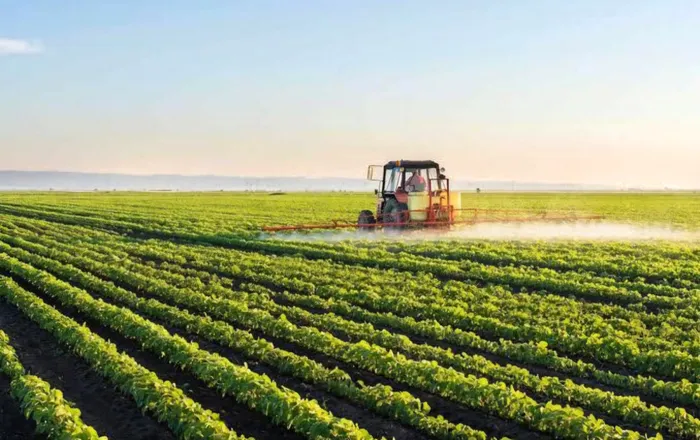Addressing the agriculture, food security, and climate change nexus is an economic imperative
CLIMATE CHANGE

Farmers, rural communities, and policymakers face an urgent challenge: how to sustainably safeguard our food systems and livelihoods against the relentless impacts, the author
Image: File
While South Africa faces many social and economic challenges, such as food insecurity and high unemployment rates, agriculture remains a vital economic sector for our growth, development and sustainable livelihoods.
The stakes are exceptionally high as the effects of climate change continue to ripple across various economic sectors. Addressing this crisis is no longer about environmental stewardship but an imperative to ensure equity, resilience, and prosperity for all South Africans.
Our agricultural sector is already bearing the brunt of a rapidly changing climate including as a result of disruptions in value chains which the sector needs to operate with optimally productivity. Rising temperatures, unpredictable rainfall, and increasingly frequent extreme weather events such as droughts, floods, and storms are now commonplace.
These disruptions reduce yields, shift growing seasons, and exacerbate pest and disease outbreaks, significantly impacting both crop and livestock productivity. For livestock farmers, heat stress, water scarcity, and a rise in vector-borne diseases pose direct threats to animal health and productivity with catastrophic impacts
Farmers, rural communities, and policymakers face an urgent challenge: how to sustainably safeguard our food systems and livelihoods against the relentless impacts.
The duality of South African agricultural sector
The agricultural landscape in South Africa is distinctly dualistic, highlighting significant disparities in productivity and resilience. Despite being positioned mid-tier globally in food security, the country experiences profound inequality within its agricultural sector.
According to a Statistics South Africa 2022 Report, approximately 107 112 households rely primarily on agriculture for income (a decline of nearly 20% since 2016).
Furthermore, 61% of whom are reported to be black farmers. Yet, according to the National Agricultural Marketing Council (NAMC) these farmers contribute only about 10% of national commercial agricultural output. This disparity underscores an urgent need for targeted support and equitable resource allocation for black farmers to achieve inclusive growth.
Food insecurity persists alarmingly across both household and regional levels. A Statistics South Africa 2021 reports that over 20% of South African households experience chronic hunger or food insecurity, with conditions especially severe in rural areas, informal settlements, and low-income communities. Key contributing factors include entrenched poverty, high unemployment rates, escalating food prices, restricted access to productive resources such as land and water, and inadequate nutritional education and healthcare.
Regional disparities and resource competition
Regional variations further complicate the national picture. In provinces such as the Northern Cape, vulnerability to drought is exacerbated by limited water resources. Furthermore, agriculture competes directly with urban and industrial demands for water, intensifying pressures on already stretched irrigation schemes and heightening regional disparities.
Addressing these complex challenges requires an integrated approach combining both adaptation and mitigation strategies. Adaptation efforts include developing drought- and heat-tolerant crop varieties, conservation agriculture practices, agro-forestry, integrated pest management, and enhanced weather forecasting.
To support these strategies, it is imperative that government provides effective policies, infrastructure investment, incentives for climate-smart agriculture, and strengthened climate services tailored specifically for farmers' needs.
Managing the untended consequences of agricultural emissions reduction target and climate action
Simultaneously, the agricultural sector has a critical role in reducing South Africa’s greenhouse gas (GHG) emissions. Agriculture stands as the second-largest GHG emitter in the country, mainly through fuel usage, livestock emissions, soil cultivation, and land-use changes. The government has responded by establishing Sectoral Emissions Targets (SETs) in April 2024, aligned with international commitments under the Paris Agreement. By 2030, agriculture's emissions must be capped at 3.37 MtCO₂eq.
While the recently promulgated Climate Change Act is important in guiding sector-wide climate responses, the agricultural community has voiced legitimate concerns regarding potential unintended consequences, especially the possibility of increased barriers to entry for emerging farmers.
For instance, the requirement to comply with SETs and navigating the regulatory requirements associated with policies and measures for emissions reductions in agriculture is quite a heavy burden, If SETs are enforced without adequate consultation or support, there is a risk of regulatory overreach. Emerging farmers may be penalised for non-compliance without having been equipped to comply.
A risk also exists that emerging farmers may be excluded from carbon pricing and offset markets due to high transaction costs, lack of capacity and lack of aggregation platforms that could widen the gap between commercial and emerging sectors, undermining the Act’s commitment to a just transition.
The fact that many emerging farmers operate on communal land may also complicate participation in climate finance schemes, access to extension support tied to compliance and eligibility for government-backed adaptation programmes.
South Africa’s agriculture sector is on the frontline of the climate crisis, and without urgent, inclusive action, the country risks deepening food insecurity and worsening inequality. Climate policies and financial mechanisms must be tailored to support emerging and marginalised farmers, thus ensuring equitable distribution of climate finance resources and agile and the much-needed disaster relief interventions.

Janse Rabie, Commissioner, Presidential Climate Commission and Head of AgriSA’s Natural Resource Centre of Excellence
Image: Supplied
Janse Rabie, Commissioner, Presidential Climate Commission and Head of AgriSA’s Natural Resource Centre of Excellence
*** The views expressed here do not necessarily represent those of Independent Media or IOL.
BUSINESS REPORT